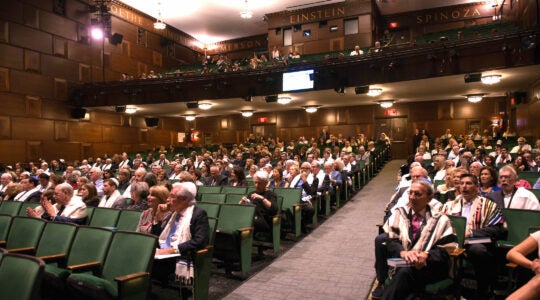Editor’s Note: In this excerpt from Dennis Ross and David Makovsky’s “Be Strong and of Courage: How Israel’s Most Important Leaders Shaped its Destiny,” published this week by PublicAffairs, it is early May 1948. And it is not at all clear whether the Jewish leadership in Palestine would take the bold risk of declaring statehood and, completely outmanned, risk war with the Arab world. For six months the Yishuv, the Jewish community in Palestine, has been under attack by the Arab Legion. David Ben-Gurion, who as head of the Jewish Agency led the Yishuv, sends foreign policy expert Moshe Sharett to Washington to meet with Secretary of State Marshall, seeking support for the diplomatic move. Political expert Golda Meir travels to Amman for a secret meeting with King Abdullah, asking him not to join the other Arab states should war break out.
On their return, the leadership of the Yishuv meets to decide its fate.
May 12 was the day when the Zionists would choose whether to declare statehood or delay. Of the thirteen members of the Zionist provisional government, only ten were present in Tel Aviv. Travel from Jerusalem, where two members were located, was too perilous, and the third was abroad. At the meeting, which would last from 10 a.m. until almost midnight, Golda Meir first imparted her discouraging findings through a scribbled note to the future prime minister. “There will be war,” it read. As Meir recounted, “I could hardly bear to watch Ben-Gurion’s face as he read the note, but thank God, he didn’t change his mind — or ours.” The Yishuv leader was not shocked by the news; he had long been dubious that Abdullah could withstand Arab pressure anyway. Meir then would give a full report to the group on her meeting with the king.
On that same day, reports reached those assembled that the Arab Legion had moved preemptively. Hundreds of Arab Legion members, backed by nearby Arab villagers, had attacked an isolated Jewish village between Jerusalem and Hebron called Kfar Etzion, killing 120, including twenty-one women.
The religious kibbutz was simply too remote to attract help from the Haganah. Determined and steady in response, Ben-Gurion said there was only one answer: defeat the Arab Legion. Even so, worse news in the form of further casualties would undoubtedly precede an ultimate victory.
Amid the distressing news from Kfar Etzion, Sharett reported on his findings from Washington and spoke at length about his conversation with Marshall, which included disappointment over the secretary of state’s preference for the Zionists to delay a declaration of statehood and U.S. calculations on how best to counter the Soviets amid faltering bilateral relations. The U.S. approach, according to a transcript of the cabinet meeting, was aimed at creating a wedge between Russia and the oil-rich Arab states. In reflecting on the State Department’s inclination to link trusteeship with a ceasefire, Sharett explained: “The main sting of a cease-fire is not a military sting, but a political sting. It is not stopping war [that is problematic] but the Jews yielding on establishing an independent state.” In other words, a stand-alone three-month truce was much less troubling than what it suggested: a prelude to an open-ended UN trusteeship that would divert Zionism from its singular goal of statehood. Sharett wondered aloud if these two ideas — the temporary truce and the subsequent trusteeship — could be decoupled. Here he also shared his sense of the authenticity of Marshall’s call for a truce. The general was not, in his approximation, employing a ruse. Sharett praised Marshall’s genuine desire to avert a regional war, “a very grave international crisis.” Citing his conversation with the secretary, Sharett “saw from [the Americans’] perspective complete candor. … They believe the declaration [of statehood] will bring [catastrophe] and it must be averted.”
Although Sharett praised Marshall as generally wanting a truce, he reached a dead end with the U.S. official over the latter’s genuine belief that the solution was a trusteeship. This was something the Zionists could not accept and was not even debated at this crucial cabinet meeting. Sharett, while acknowledging that the current idea for a truce “needed to be fixed,” contended that the Zionists should not rule it out if it could be divorced from trusteeship. To be sure, everyone around the table wanted a state; the question was whether the Zionists could cull the benefits of a truce while extracting a pledge that the United States would favor statehood after that interim period. The participants also measured the risks of defying U.S. wishes at this historic juncture.
Ultimately, Sharett admitted Marshall would give no such assurances about what would happen at the end of three months. This was important to Ben-Gurion, who wrote in his diary that if the United States confronted a new Jewish state militarily, the new state could not survive. Sharett said he could not recommend against declaring a state, even as he sensed that a legal framework for statehood that would be both legitimate under international law and realistically workable should allow some lag time. Such a formulation could, for example, establish an interim government for a number of months, after which a sovereign state could be declared. This approach, he believed, could reduce potential antagonism with Marshall while providing the benefits of an immediate truce — namely, time for the Haganah [the Yishuv’s armed forces] to prepare for full-fledged war. Yet these ideas he merely mentioned rather than emphasized, in effect staying publicly loyal to Ben-Gurion’s vision.
Next, acting commander Yigael Yadin and acting chief of staff Yisrael Galili offered their military assessments at this profoundly historic juncture about whether the state would indeed be born. After Yadin made his presentation, the ministers wanted to know if he felt that a truce was preferable from a military perspective. The duo clearly favored a truce but did not comment on the political dimension of Marshall’s idea (that is, trusteeship) due to their professional positions as military men. They were also careful not to emphatically press for a truce, given the controversy. However, they raised broad questions about whether the Yishuv at that very moment in time could withstand a multifront war, given the lack of military preparedness. According to an abridged, declassified Hebrew transcript, Yadin remarked on his wish for an extra two months beyond the May 15 deadline. And he spoke somberly about the prospects of an invasion. Indeed, Yadin had been the one to report the high casualties then being suffered at Kfar Etzion. He and his fellow military leaders had been “mistaken,” he said, in believing Arab forces would not strike before a full declaration of war.
Remarking on the Kfar Etzion situation, Galili noted his concern that the Arab Legion’s involvement would energize local Arabs regarding the possibility of victory. After Yadin ticked off how many forces each of the Arab armies had, he acknowledged that, while the numbers were not overwhelming, he did feel that the Zionists had to move troops around in order to meet the attack of the Arab armies, and this left certain areas vulnerable. Conversely, the attack could well hinder Jewish morale, which was low due to the news that many Jews had been killed that day in Kfar Etzion and that there had not been reinforcements to save the kibbutzniks. Yadin, who had started off saying that the chances of success for the Zionists were 50/50, modified that statement. Then, when pressed, in assessing the chances for war, Yadin identified the Arabs as having “a considerable advantage.” He said, “I would like to summarize and to be cautious, and I would say at this moment the chances are equally weighted. But if I was more candid, I would say that their advantage is great, if all of this power would come and fight us.”
This was breathtaking. On the one hand, Ben-Gurion wanted to declare a state, but Yadin and Galili thought the status quo had profound military disadvantages for the Zionists. They clearly wanted a truce. The nascent state was about to fight multiple Arab armies. But some 30 to 40 percent of the Haganah units were not yet armed. They had no fighter aircraft, only primitive planes, and virtually no cannons. The promised new supplies and aircraft coming from abroad had not yet arrived. There was also a fatigue among the units, some of whom had been fighting since partition, almost six months earlier. This also reflected a shortage of manpower: only about a thousand troops, he added, were available to defend the entire southern part of the country. Galili also pointed to an imbalance in heavy armaments, which would lead to “very grave” consequences “if the confrontation occurs during the coming week.” Despite their reluctance to comment on political matters, both military leaders were explicit that a cease-fire for a “certain time would be of great benefit for us.” There’s no doubt that Yadin’s overarching point was that a truce would give Israel more time to prepare militarily, to arm itself, and to hopefully integrate weaponry that would come from abroad. He thought a delay would make the Zionists stronger.
The assessments of Yadin and Galili were devastating. The two commanders of the military clearly favored a truce. It was now up to Ben-Gurion to do what he did best: force a discussion toward his preferred decision. Against the commanders’ measured approach, he left no doubt about where he stood. While careful not to contradict any of their facts, he refused to waver. It was classic Ben-Gurion, analytical and unambiguous. “I don’t see any advantage to a cease-fire,” he said. He viewed a cease-fire as a trap, and laid out three possible scenarios. In the first, a cease-fire “hermetically” imposed equally on the two sides would, thanks to Zionist motivation, ultimately spur a Jewish victory: feeling that its back was against the wall, the Yishuv would be able to reorganize and increase its ability to have the upper hand when the conflict recommenced. However, in and of itself, this scenario was insufficient, because the Yishuv would be cut off from support that was beyond its borders, namely manpower and weaponry. In the second scenario, the United States or Britain would lead a blockade against the Zionists, a “very dangerous” situation in which the Zionists would require many miracles to prevail. And in the third, the most likely in his view, a cease-fire would be imposed unevenly, because it could be imposed on the Palestinian Arabs but would never extend to all the surrounding Arab countries. As a result, the Arab states would continue to arm themselves to the detriment of the Zionists.
A declaration of statehood, by contrast, would allow the Zionists to tap their greatest resource — supporters abroad — who could help smuggle weaponry into the nascent country once the British departed. Yes, the Arab states too could rearm, and more tragic attacks, like the one at Kfar Etzion, were bound to occur. General Arab rearmament, however, did not bother him so long as the Zionists could revitalize their own military. The opportunity to do so, prompted by statehood and denied by a truce, must not be missed. Alongside the military advantage was that offered by unchecked immigration, Ben-Gurion’s touchstone. Open gates would mean an inflow of greatly needed manpower. With a cease-fire, though, Ben-Gurion argued, “the aliyah will be handcuffed and our ability to bring in weapons will be handcuffed.”
Ben-Gurion responded to Yadin. The military leader had said a month and a half ago that the people’s morale was not high, and now he was concerned with what happened in Kfar Etzion. There were no reinforcements, and Yadin was worried that morale would fall when people were up against heavy weapons. Ben-Gurion made the alternative case on morale. Victories in Haifa, Tiberias, Safed, and Jaffa, he contended, had boosted the public mood, creating in recent weeks “a feeling of moral ascendancy and military superiority.” A cease-fire, he said, would halt this momentum, allowing the Arabs to regroup. While admitting that many thousands of soldiers lacked weapons, he noted opportunities to rectify the situation, such as through drafting fifteen thousand non-enlisted weapon owners. Concluding, he admitted that “the situation is difficult and filled with dangers,” yet added that the Zionists could be “decisive” through wise deployment of military resources and enactment of moral values. Thus, despite an evidently weak hand, Ben-Gurion used the sheer power of argument and a vision of victory, tools he’d been wielding for decades, to persuade his cabinet of the merits of declaring statehood. Ben-Gurion was once again decisive and would carry the day.
While no formal vote appears to have been held — perhaps no one wanted to go on the record supporting a delay in statehood — the substance and tone of the speakers during this fateful session are interesting. Six seem to have wanted to declare independence on May 14, while four favored postponement and accepting a truce. The previously ambivalent Sharett was in the independence-now category, breaking the tie.
The only remaining issue for the moment was whether the declaration of independence would include a reference to borders. Staunchly against such a move because it could seal a geographically fragmented territory, Ben-Gurion cited the U.S. founders, who did not delineate territory in their 1776 declaration. Besides, if the Arabs launched a war, they would cede the moral authority needed to insist on a return to their desired frontier. In this, Ben-Gurion had been consistent since the aftermath of the Peel findings in 1937, when he had written to his son Amos. If the Arabs picked a fight with a new Jewish state, then they would bear the consequences of that decision.
On Friday, May 14, moments before the onset of Sabbath, Ben-Gurion recited the declaration before a jubilant crowd in Tel Aviv. While resolute in public, only in his diary did he allow his worries to show. As after the UN partition vote, he did not celebrate. Now, he wrote, the people’s “fate [is] in the hands of the defense forces.” Perhaps fittingly, he wrote this very entry in a new diary, as the next chapter of Jewish statehood was about to unfold.
Related: Two New Books Offer Differing Character Studies On Israel
The New York Jewish Week brings you the stories behind the headlines, keeping you connected to Jewish life in New York. Help sustain the reporting you trust by donating today.




